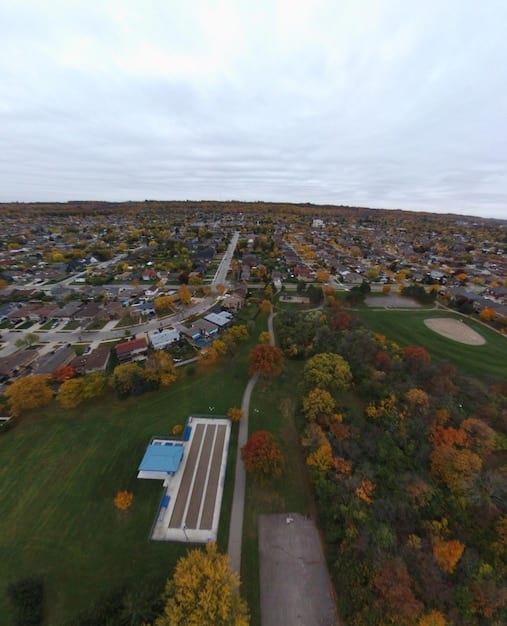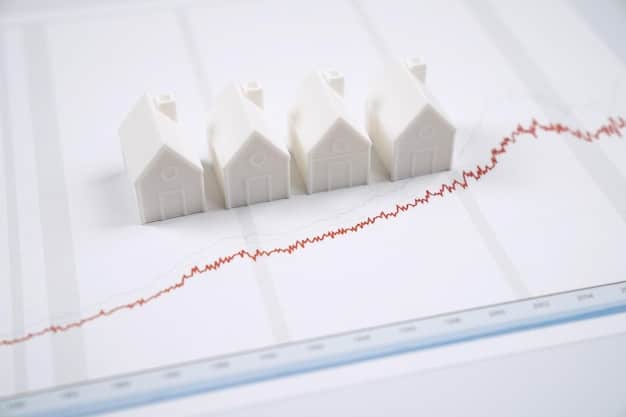Housing Market Update: Mortgage Rates Forecast to Hit 7.5% Next Quarter

Housing Market Update: Experts predict mortgage rates will climb to 7.5% in the next quarter, potentially impacting home affordability and buyer activity across the US housing market.
Get ready for some potential shifts in the housing market! The latest Housing Market Update: Mortgage Rates Expected to Rise to 7.5% by Next Quarter suggests that aspiring homeowners and current mortgage holders may need to brace themselves for higher borrowing costs. Let’s dive into what this could mean for you.
Housing Market Update: Understanding the Impending Mortgage Rate Hike
The US housing market is a dynamic landscape, influenced by various economic factors. One of the most significant of these is the prevailing mortgage rate. As we move into the next quarter, forecasts indicate a notable increase in these rates. Understanding the potential implications of this shift is vital for anyone involved in the real estate sector.
What’s Driving Mortgage Rates Up?
Several factors contribute to the fluctuating nature of mortgage rates. These include the overall health of the economy, inflation rates, and policies set by the Federal Reserve. When the economy is strong, and inflation is under control, mortgage rates tend to be more stable. However, current conditions suggest upward pressure.
- Economic Growth: A growing economy can lead to increased demand for credit, potentially pushing interest rates higher.
- Inflation Concerns: Persistent inflation can erode the value of money, prompting lenders to increase rates to compensate for the risk.
- Federal Reserve Actions: The Fed’s monetary policy decisions, such as raising the federal funds rate, directly influence mortgage rates.

How High Could Rates Actually Go?
While forecasts suggest a rise to 7.5%, it’s essential to remember that these are predictions based on current data. The actual rate could vary depending on unforeseen economic events. Monitor reliable financial news sources for the most up-to-date information.
In conclusion, understanding the reasons behind the forecast increase in mortgage rates is crucial for navigating the housing market. By staying informed and considering these factors, both buyers and sellers can make more strategic decisions.
The Impact of Higher Mortgage Rates on Homebuyers
For prospective homebuyers, an increase in mortgage rates can have a significant impact on affordability. Higher rates translate to larger monthly payments, which can strain household budgets and potentially disqualify some buyers from securing a mortgage.
Reduced Purchasing Power
As rates rise, the amount that buyers can afford to borrow decreases. This means they may have to lower their sights on the type or location of property they can realistically purchase. Here’s how rising rates affect purchasing power:
- Lower Loan Amounts: Banks may approve smaller loan amounts due to higher monthly payment obligations.
- Increased Down Payments: Buyers might need to increase their down payment to compensate for the reduced borrowing capacity.
- Delayed Homeownership: Some potential buyers may delay their plans to buy a home until rates become more favorable.
The Ripple Effect on Housing Demand
Higher mortgage rates can cool down the overall housing demand, potentially leading to a more balanced market. However, this effect may vary depending on the region and the specific segment of the market.
Ultimately, the impact on homebuyers can be substantial, affecting their financial strategies and home-buying decisions. Staying informed and adapting to these changes is essential for navigating the market effectively.
How Current Homeowners Might Be Affected
While the rise in mortgage rates primarily affects new homebuyers, current homeowners are not entirely immune. Refinancing options, home equity lines of credit (HELOCs), and the overall value of their property can all be influenced by these changes.

Refinancing Considerations
For homeowners who are considering refinancing their existing mortgage, rising rates can make it less attractive. If current rates are higher than their existing mortgage, refinancing may not result in significant savings.
Homeowners should carefully evaluate their financial situation before making any decisions about their existing mortgage. Seeking advice from a financial advisor can provide valuable insights tailored to their individual circumstances.
Will This Shift Cause a Housing Market Correction?
The prospect of rising mortgage rates often raises concerns about a potential housing market correction. While a correction is not guaranteed, it’s essential to consider the factors that could contribute to such a scenario.
Inventory Levels: A Key Factor
One of the most critical factors is the level of housing inventory. If inventory remains low, even with higher rates, the market may continue to be competitive. However, if inventory increases, the balance of power could shift towards buyers.
Regional Variations
It’s also essential to recognize that the housing market is not uniform across the country. Different regions may experience varying degrees of impact depending on local economic conditions and demographics. Some areas may be more resilient to rate hikes, while others may be more sensitive.
Assessing the likelihood of a housing market correction requires a comprehensive understanding of these factors and their potential interplay. By monitoring inventory levels, economic indicators, and regional trends, stakeholders can better anticipate and prepare for possible shifts.
Strategies for Buyers and Sellers in a Rising Rate Environment
Navigating the housing market in an environment of rising mortgage rates requires careful planning and strategic decision-making. Both buyers and sellers need to adapt their approaches to optimize their outcomes.
For Buyers: Lock in Rates and Explore Options
Potential buyers should consider locking in a fixed mortgage rate as soon as possible to protect themselves from further increases. Additionally, they should explore different types of mortgages, such as adjustable-rate mortgages (ARMs), keeping in mind the potential risks.
For Sellers: Price Competitively and Highlight Value
Sellers need to price their properties competitively to attract buyers in a more rate-sensitive market. Highlighting the unique features and value of their homes can also help differentiate them from the competition.
Ultimately, success in a rising rate environment depends on adaptability, thorough planning, and a clear understanding of market dynamics. By implementing these strategies, both buyers and sellers can navigate the challenges and achieve their real estate goals.
Expert Predictions and Future Outlook
To gain a deeper understanding of the potential future direction of the housing market, it’s helpful to consider the insights of industry experts and their predictions.
What the Experts Are Saying
Many experts anticipate that mortgage rates will continue to rise gradually over the next few quarters. However, they also emphasize that the market is likely to remain relatively stable due to factors such as strong employment and limited housing supply.
The future outlook for the housing market is subject to numerous variables, including shifts in economic policy, global events, and consumer confidence. Staying informed and adaptable will be key to navigating the evolving landscape successfully.
| Key Point | Brief Description |
|---|---|
| 🏠 Rate Hike | Mortgage rates are expected to rise to 7.5% next quarter. |
| 💰 Buyer Impact | Reduced purchasing power for potential homebuyers. |
| 🏘 Seller Strategy | Competitive pricing is crucial for sellers. |
| 📈 Market Outlook | Experts predict a gradual rise with a relatively stable market. |
Frequently Asked Questions
▼
A 7.5% mortgage rate will increase your monthly payments compared to lower rates. The exact amount depends on the loan size, but expect to pay more per month, affecting affordability.
▼
Waiting depends on your financial situation and market predictions. If you can afford it and find a suitable property, buying now might be better than waiting for uncertain rate drops.
▼
Sellers should price their homes competitively, highlight unique features, and consider offering incentives such as covering closing costs to attract buyers in a market with high mortgage rates.
▼
Adjustable-rate mortgages (ARMs) can be risky in a rising rate environment. While they may start with lower rates, they can increase over time, making budgeting unpredictable. Assess your risk tolerance carefully.
▼
Rising rates can cool down the housing market by reducing demand and increasing inventory. This can lead to slower price appreciation and a more balanced market favoring buyers.
Conclusion
In conclusion, the expected rise in mortgage rates to 7.5% presents both challenges and opportunities for homebuyers, sellers, and current homeowners. Staying informed, adapting strategies, and seeking expert advice are crucial for navigating the evolving housing market effectively.





